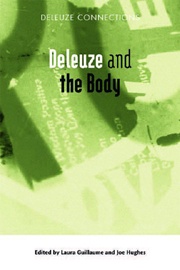Introduction: Pity the Meat?: Deleuze and the Body
Published online by Cambridge University Press: 12 September 2012
Summary
The question animating this volume is simple: is there a coherent theory of the body in Deleuze, and if there is, what can we do with it? If the question needs to be asked, it is because the body has an uncertain place in Deleuze's work. It is its own kind of Erewhon: simultaneously ‘now here’ and ‘nowhere’.
As evidence for its omnipresence we could begin by citing his writings on Spinoza. The ‘properly ethical question’, Deleuze tells us, is ‘what can a body do?’ Nietzsche and Philosophy takes this ethical question further, constructing a typology of corporeal forms based on each body's composition of forces. The two geneses of The Logic of Sense have their origin in ‘corporeal depths’. The classification of images in Cinema 1 is not an empirical, inductive classification. Rather, the categories of cinema are the categories of a body emerging from the plane of immanence. In Francis Bacon the meat is a lithe, acrobatic material which can enter into various characteristic relations. It is a constellation containing colors of such splendor that Bacon becomes a religious painter when he enters butcher shops.
Not only is the concept of the body nearly everywhere we look in Deleuze's work, but it has also gone on to inform some of the most influential conceptions of the body in contemporary critical debate. Elizabeth Grosz, Moira Gatens, Patricia Clough and Rosi Braidotti, to name only a few, have engaged critically with Deleuze's writings on the body.
- Type
- Chapter
- Information
- Deleuze and the Body , pp. 1 - 6Publisher: Edinburgh University PressPrint publication year: 2011



